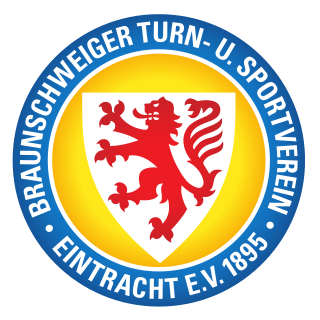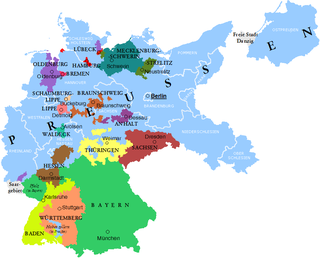
SV Arminia Hannover is a German association football club based in Hanover, Lower Saxony.
The German football league system, or league pyramid, refers to the hierarchically interconnected league system for association football in Germany that in the 2016–17 season consisted of 2,235 leagues in up to 13 levels having 31,645 teams, in which all divisions are bound together by the principle of promotion and relegation. The top three professional levels contain one division each. Below this, the semi-professional and amateur levels have progressively more parallel divisions, which each cover progressively smaller geographic areas. Teams that finish at the top of their division at the end of each season can rise higher in the pyramid, while those that finish at the bottom find themselves sinking further down. Therefore, in theory, it is possible for even the lowest local amateur club to rise to the top of the system and become German football champions one day. The number of teams promoted and relegated between the divisions varies, and promotion to the upper levels of the pyramid is usually contingent on meeting additional criteria, especially concerning appropriate facilities and finances.

SG Rot-Weiss Frankfurt 01 is a German association football club from Frankfurt am Main. The association was founded on 11 November 1901 as FV Amicitia 1901 Bockenheim in what is today the city district of Bockenheim.

VfB Rot-Weiß 04 Braunschweig is a German association football club from the city of Braunschweig in Lower Saxony and is part of a larger sports club with departments for women's and youth football, gymnastics, team handball, table tennis, tennis, volleyball.

The Oberliga Niedersachsen, sometimes referred to as Niedersachsenliga, is the fifth tier of the German football league system and the highest league in the German state of Lower Saxony. Since 1994, the league was split into a western and an eastern group. In 2010, it returned to a single-division format. The Oberliga moved to a north-south split for one season in 2020. It is one of fourteen Oberligen in German football, the fifth tier of the German football league system.

The Gauliga Niedersachsen was the highest football league in the Prussian Province of Hanover and the German states of Bremen, Brunswick, Schaumburg-Lippe and Oldenburg from 1933 to 1945. Shortly after the formation of the league, the Nazis reorganised the administrative regions in Germany, and the GaueSüdhannover-Braunschweig, Ost-Hannover and Weser-Ems de facto replaced the Prussian province and the German states in the region of Lower Saxony (German:Niedersachsen), although de jure the old states continued to exist.

Eintracht Braunschweig II is the amateur team, formerly the reserve team, of German football club Eintracht Braunschweig.

The Goslarer SC 08 is a German association football club from the city of Goslar, Lower Saxony.
The Landesliga Weser-Ems, called the Bezirksoberliga Weser-Ems from 1979 to 1994 and 2006 to 2010, is the sixth tier of the German football league system and the second highest league in the German state of Lower Saxony (German:Niedersachsen). It covers the region of the now defunct Regierungsbezirk Weser-Ems.
The Landesliga Hannover, called the Bezirksoberliga Hannover from 1979 to 1994 and 2006 to 2010, is the sixth tier of the German football league system and the second highest league in the German state of Lower Saxony. It covers the region of the now defunct Regierungsbezirk Hanover.
The Landesliga Braunschweig, called the Bezirksoberliga Braunschweig from 1979 to 1994 and 2006 to 2010, is the sixth tier of the German football league system and the second highest league in the German state of Lower Saxony. It covers the region of the now defunct Regierungsbezirk Braunschweig.
The Landesliga Lüneburg, called the Bezirksoberliga Lüneburg from 1979 to 1994 and 2006 to 2010, is the sixth tier of the German football league system and the second highest league in the German state of Lower Saxony (German:Niedersachsen). It covers the region of the now defunct Regierungsbezirk Lüneburg.

TuS Celle FC is a football club based in Celle, Lower Saxony, Germany. They are currently members of the Kreisliga Celle and play at the Günther-Volker-Stadion.

Freie Turnerschaft Braunschweig, commonly known as Freie Turner, FT Braunschweig or simply FTB, is a German association football and sports club based in Braunschweig, Lower Saxony.

The Oberliga Südhannover/Braunschweig, also known as Südkreisliga and Bezirksliga Südhannover/Braunschweig at various points, was one of several first tier association football leagues in Germany from 1921 to 1933. The league covered the Free State of Brunswick and the southern part of the Prussian Province of Hanover.

SV Drochtersen/Assel is a German association football club from the municipality of Drochtersen, Lower Saxony. The club's greatest success has been promotion to the tier four Regionalliga Nord in 2015 after winning the Niedersachsenliga.

MTV Wolfenbüttel is a German association football and sports club based in Wolfenbüttel, Lower Saxony.

The 1962–63 2. Oberliga was the fourteenth 2. Oberliga season, the second tier of the football league system in West Germany. The league operated in three regional divisions, South, Southwest and West. In Northern Germany and West Berlin the 2. Oberliga did not existed, local Amateurligas taking their place instead as the second tier of the league system.
The 2014–15 season of the Niedersachsenliga, the highest association football league in the German state of Lower Saxony, was the seventh season of the league at tier five (V) of the German football league system.
Aljoscha Lartey Hyde is a German-Ghanaian footballer who plays as a defender for Oberliga Niedersachsen club SV Ramlingen-Ehlershausen.













